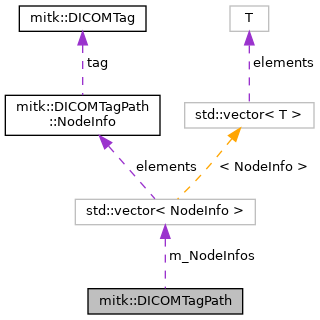Class is used to identify (nested) attributes in a DICOM dataset. In contrast to the class DICOMTag, which only specifies one specific tag, the tag path can identify nested attributes (like items in a DICOM sequence). In addition you may also specify wildcards for the selection index or complete elements of the path.
More...
#include <mitkDICOMTagPath.h>
Class is used to identify (nested) attributes in a DICOM dataset. In contrast to the class DICOMTag, which only specifies one specific tag, the tag path can identify nested attributes (like items in a DICOM sequence). In addition you may also specify wildcards for the selection index or complete elements of the path.
Definition at line 34 of file mitkDICOMTagPath.h.
◆ ItemSelectionIndex
◆ NodeInfoVectorType
◆ PathIndexType
◆ DICOMTagPath() [1/4]
| mitk::DICOMTagPath::DICOMTagPath |
( |
| ) |
|
◆ DICOMTagPath() [2/4]
| mitk::DICOMTagPath::DICOMTagPath |
( |
const DICOMTagPath & |
path | ) |
|
◆ DICOMTagPath() [3/4]
| mitk::DICOMTagPath::DICOMTagPath |
( |
const DICOMTag & |
tag | ) |
|
◆ DICOMTagPath() [4/4]
| mitk::DICOMTagPath::DICOMTagPath |
( |
unsigned int |
group, |
|
|
unsigned int |
element |
|
) |
| |
|
explicit |
◆ ~DICOMTagPath()
| virtual mitk::DICOMTagPath::~DICOMTagPath |
( |
| ) |
|
|
virtual |
◆ AddAnyElement()
◆ AddAnySelection()
| DICOMTagPath& mitk::DICOMTagPath::AddAnySelection |
( |
unsigned int |
group, |
|
|
unsigned int |
element |
|
) |
| |
◆ AddElement()
| DICOMTagPath& mitk::DICOMTagPath::AddElement |
( |
unsigned int |
group, |
|
|
unsigned int |
element |
|
) |
| |
◆ AddNode()
Adds a new node to the end of the path.
- Parameters
-
| [in] | newNode | Reference to the node that should be added. |
- Returns
- Returns the index of the newly added node.
◆ AddSelection()
◆ DICOMTagPathesMatch()
◆ Equals()
| bool mitk::DICOMTagPath::Equals |
( |
const DICOMTagPath & |
path | ) |
const |
Checks if to DICOMTagPathes are specify the same node. Hence all wildcards will be processed.
E.G.: "item1/child1/grandChild2" == ".//item1//grandChild2" is true.
◆ FromStr()
| DICOMTagPath& mitk::DICOMTagPath::FromStr |
( |
const std::string & |
pathStr | ) |
|
◆ GetFirstNode() [1/2]
| NodeInfo& mitk::DICOMTagPath::GetFirstNode |
( |
| ) |
|
Function returns the node info of the first path node within the DICOMTagPath.
- Precondition
- DICOMTagPath must not be empty.
- Returns
- Info of the first path node. If the path is empty, an InvalidPathNode exception will be thrown.
◆ GetFirstNode() [2/2]
| const NodeInfo& mitk::DICOMTagPath::GetFirstNode |
( |
| ) |
const |
Function returns the node info of the first path node within the DICOMTagPath.
- Precondition
- DICOMTagPath must not be empty.
- Returns
- Info of the first path node. If the path is empty, an InvalidPathNode exception will be thrown.
◆ GetLastNode() [1/2]
| NodeInfo& mitk::DICOMTagPath::GetLastNode |
( |
| ) |
|
Function returns the node info of the last path node within the DICOMTagPath.
- Precondition
- DICOMTagPath must not be empty.
- Returns
- Info of the first path node. If the path is empty, an InvalidPathNode exception will be thrown.
◆ GetLastNode() [2/2]
| const NodeInfo& mitk::DICOMTagPath::GetLastNode |
( |
| ) |
const |
Function returns the node info of the last path node within the DICOMTagPath.
- Precondition
- DICOMTagPath must not be empty.
- Returns
- Info of the first path node. If the path is empty, an InvalidPathNode exception will be thrown.
◆ GetNode() [1/2]
Function returns the node info of a path node specified by the index within the DICOMTagPath.
- Precondition
- Passed index must not be out of bound.
- Parameters
-
| [in] | index | Index of the node whose info should be retrieved. |
- Returns
- Info of the specified path node. If the index is out of bound an InvalidPathNode exception will be thrown.
◆ GetNode() [2/2]
Function returns the node info of a path node specified by the index within the DICOMTagPath.
- Precondition
- Passed index must not be out of bound.
- Parameters
-
| [in] | index | Index of the node whose info should be retrieved. |
- Returns
- Info of the specified path node. If the index is out of bound an InvalidPathNode exception will be thrown.
◆ GetNodes()
◆ HasItemSelectionWildcardsOnly()
| bool mitk::DICOMTagPath::HasItemSelectionWildcardsOnly |
( |
| ) |
const |
Returns if the path has any nodes with item selection wild cards ([*]).
◆ IsEmpty()
| bool mitk::DICOMTagPath::IsEmpty |
( |
| ) |
const |
◆ IsExplicit()
| bool mitk::DICOMTagPath::IsExplicit |
( |
| ) |
const |
Returns if the path is explicit (has no wildcards).
◆ operator<()
| bool mitk::DICOMTagPath::operator< |
( |
const DICOMTagPath & |
right | ) |
const |
◆ operator=()
◆ operator==()
| bool mitk::DICOMTagPath::operator== |
( |
const DICOMTagPath & |
path | ) |
const |
Compares two DICOMTagPaths for real equality. So its a string compare of their string conversion
◆ Reset()
| virtual void mitk::DICOMTagPath::Reset |
( |
| ) |
|
|
virtual |
◆ Size()
◆ ToStr()
| std::string mitk::DICOMTagPath::ToStr |
( |
| ) |
const |
◆ m_NodeInfos
The documentation for this class was generated from the following file:

